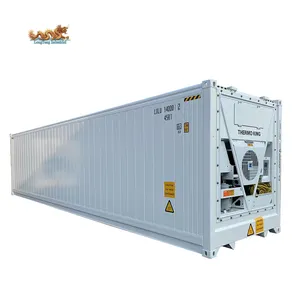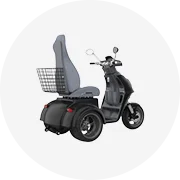

40ft Shipping Container NEW 40ft Reefer Container 40 Feet Length Refrigerated Container Price For Sale


















Reefer containers, known as refrigerated containers, are specialized units tailored to transport perishable goods necessitating precise temperature control. These containers are vital for industries handling perishables like food and pharmaceuticals, safeguarding them from spoilage due to temperature variations. The refrigeration mechanism mirrors household fridges, utilizing a compressor to circulate cold air and expel hot air to sustain the required temperature.
Constructed with insulating materials such as steel, aluminum, or stainless steel, refrigerated containers are equipped with refrigeration units enabling temperature adjustments typically ranging from -30°C to 30°C (-22°F to 86°F) based on cargo requirements. These containers feature airtight technology to curb temperature fluctuations and uphold internal conditions.
Playing a pivotal role in preserving perishable items' quality during long-haul transit, refrigerated containers ensure goods reach consumers in pristine condition as initially packed. Moreover, their usage extends the shelf life of products, advantageous for businesses eyeing international exports.
Diverse types of refrigerated containers cater to varied shipping prerequisites:
General Purpose Containers: These versatile units, available in different sizes, are widely used for shipping various products, both chilled and frozen.
High Cube Containers: Offering increased cubic capacity, these are ideal for bulky items or maximizing load efficiency, especially for goods requiring precise temperature control over extensive distances.
Refrigerated Containers with Doors on Each End: Facilitating convenient access to stored goods, particularly useful in scenarios where dual-end loading and unloading are required for swift product access.
Open Top Containers: Featuring a removable top for top-loading, beneficial for crane-loaded goods, often incorporating both refrigerated and non-refrigerated sections.
Flat Rack Containers: Wall-less flatbed design, suitable for elements-exposed goods during transit, ensuring easy loading and unloading.
Selecting an appropriate refrigerated container involves evaluating cargo type, transit conditions, and specific requirements. For instance, for long-distance perishable food shipping, opt for containers with precise temperature controls such as refrigerated or insulated units. Consider aspects like material durability, maintenance ease, and energy efficiency in decision-making.
Container size and type hinge on cargo quantity, dimensions, and unique handling necessities. Businesses shipping small, temperature-sensitive loads may suffice with an insulated container, while those transporting larger volumes might prefer high-capacity refrigerated containers without compromising space efficiency.
When contemplating a purchase on Alibaba.com, assess suppliers' capacity to meet these specific needs. Leverage the platform's filtering tools to pinpoint suppliers aligned with industry focus and key product features like material construction or core components such as PLCs (Programmable Logic Controllers).
Alibaba.com showcases a wide array of refrigerated containers suitable for diverse industries, from grocery storage solutions for food shops to shipping temperature-sensitive pharmaceuticals for healthcare companies. With abundant options on the platform, businesses can discover tailored matches meeting their distinct shipping requisites.
The material diversity ensures finding containers with high durability like steel or visually appealing stainless finishes. Advanced filtering tools simplify navigation based on industry norms like size or material type.
Besides offering an extensive selection, Alibaba.com provides buyer support like Trade Assurance, ensuring secure transactions until delivery completion. This commitment to secure and dependable trade experiences underscores Alibaba.com as a preferred platform for acquiring refrigerated containers aligning with operational needs and quality benchmarks.
A refrigerated container is designed to transport products at specific temperatures, ensuring their freshness and safety, commonly used for perishable goods like food and pharmaceuticals requiring precise temperature regulation.
Refrigerated containers utilize an integrated refrigeration system with a compressor, condenser, and evaporator to uphold consistent temperatures, even in high ambient conditions.
Refrigerated containers provide a dependable temperature-controlled environment for products, preserving their freshness and safety throughout transit, ideal for perishable goods necessitating specific temperature ranges.
Many suppliers offer customization options for refrigerated containers, enabling businesses to tailor features to meet specific shipping and operational requirements.
Factors like cargo type, temperature specifications, transit duration, and additional services such as pre-cooling or modifications tailored to shipping needs should be taken into account.
Refrigerated containers are suitable for a wide range of cargoes including food, pharmaceuticals, flowers, and certain chemicals, contingent on the container's design and temperature control capabilities.
To guarantee product quality during transit, opt for reputable suppliers adhering to industry standards and consider utilizing services like Trade Assurance on Alibaba.com for added protection.
Refrigerated containers typically need electricity or a generator for operation, necessitating compatibility with available infrastructure at the location.
During downtime, thoroughly clean the refrigerated container, turn off the refrigeration system, and conduct regular maintenance checks to ensure its optimal condition.
Refrigerated containers are suitable for both land and sea transport, engineered to maintain consistent temperatures, making them ideal for international shipping.
Refrigerated containers offer various temperature control settings from freezing to chilling, catering to preserving different cargo types at their requisite temperatures.
Some refrigerated containers feature generators for power autonomy without electricity access, though the effectiveness varies with model and manufacturer.
The servicing frequency for a refrigerated container depends on usage intensity, typically involving regular inspections and maintenance to ensure all components function effectively.